Stockholm World Water Week: More desirable water filters is answer to 'last mile' issue
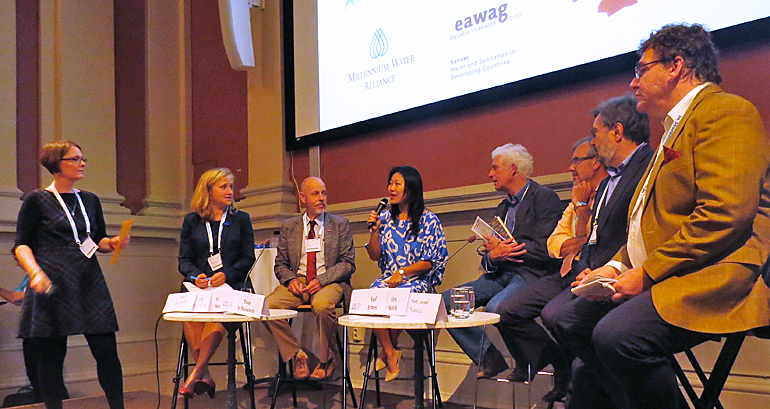 "Use subsidies to stimulate the demand for household water filters. That assures people will actually use the filter. Stop grants for giving them away for free", urged Henk Holtslag of Smart Centre Group, when he addressed the sensitive issue of subsidizing household water filters in poor areas. "People like aspirational products. That is where our focus should be".
"Use subsidies to stimulate the demand for household water filters. That assures people will actually use the filter. Stop grants for giving them away for free", urged Henk Holtslag of Smart Centre Group, when he addressed the sensitive issue of subsidizing household water filters in poor areas. "People like aspirational products. That is where our focus should be".
Holtslag made his remarks during a panel discussion on scaling up the delivery of real safe water at the Stockholm World Water Week on 27 August.
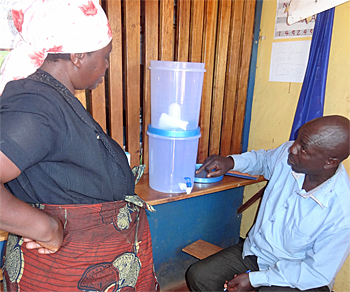
The Tulip household water filter that is produced and sold by Basic Water Needs in India and Malawi.
Recontamination of drinking water
The discussion on household water filters relates to the poor water quality and water-borne diseases in rural areas and slums. This is referred to as 'the last mile'. Many people get their drinking water from a central well or tapping point somewhere in the village or city ward. Carrying it home, the water can easily get contaminated again.
So the issue of access to clean water goes way beyond the 700 million unserved people that is being pursued by the UN global water goal.
It is estimated that at this moment some 2 billion people in the world lack access to safe drinking water at the point of use.
Combat water-borne diseases
All panelists that participated in the session at the Stockholm Water Week were convinced that household water filters plays an important role in closing this 'last mile'. Especially in areas where water utilities are unable to deliver really clean drinking water for longer periods per day.
However, it proves difficult to convince people to purchase a water filter for health reasons. According to the panelists this issue gets too little attention in the discussion on the new sustainable development goals. The quality of the drinking water is as important as the accessibility.
The delivery of really clean water is considered crucial to combat waterborne diseases that cause 800,000 deaths annually.
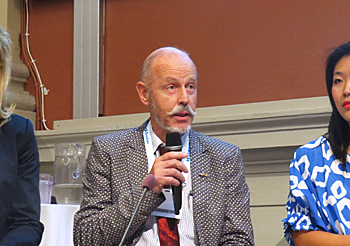 Henk Holtslag advocated subsidies to be used for creating more demand, not for giving away filters for free.
Henk Holtslag advocated subsidies to be used for creating more demand, not for giving away filters for free.
Self-supporting supply centres
Henk Holtslag has 25 years of experience with small water facilities in developing countries. During his 8-years stay in Nicaragua he was involved in the installation of 50.000 rope pumps that had been produced by local workshops.
Currently Holtslag is focusing on the introduction of low-cost water technologies in Africa. He assists in the start of three Smart Centres in Tanzania, Malawi and Mozambique. These centres are self-supporting and specialized in delivery and repairing of low-cost water products, such as hand pumps, household water filters and zero cement latrines.
An important activity of the centres is the training of technicians and entrepreneurs to build up supply chains of market based products.
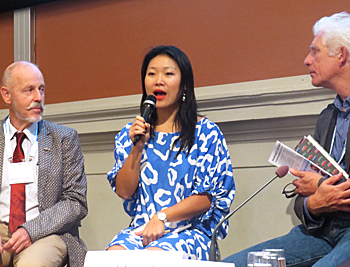 Yi Wei of iDE emphasised the importance of design and marketing of desirable filters.
Yi Wei of iDE emphasised the importance of design and marketing of desirable filters.
Dignified customers
Also on the panel was Yi Wei of International Development Enterprises (iDE). "It is time that we treat the poor with the dignity of a customer and not just a beneficiary who is handed free things he does not want", she said provocative.
Her organization has been very successful in Cambodia setting up a local market for latrines. Wei is now involved in the development of a low-cost ceramic household filter. iDE created a special social enterprise to produce and sell the filter in Cambodia.
"In order to scale up we have to bring in the big players. They are needed to capitalize the local markets", Wei said. Multi-nationals as Unilever, Coca Cola and Nestlé have already shown interest in selling water filters not only to middle-income households but also to the poor. "We are partnering with them to explore the whole supply chain. From designing an aspirational filter, to local distribution and door-to-door sales campaigns".
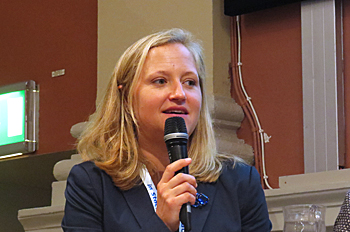 Maggie Montgomery of WHO underlined the importance of household filters to combat the annual death of 800.000 people because of water-borne diseases.
Maggie Montgomery of WHO underlined the importance of household filters to combat the annual death of 800.000 people because of water-borne diseases.
Impacts on water utilities
The question was raised whether the supply of household filters does not undermine the activities of the local water utility that may lose customers.
"It is not either or", reacted Maggie Montgomery of the the World Health Organization (WHO). "It differs per case. If a utility is able to guarantee the delivery of clean water by pipe, a household can buy a filter." This does not necessarily bypass utilities, it can also be additional."
Dilemma of subsidised prices
It was considered inevitable that the sales of water filters has to be subsidised in order to reach poor households and improve the quality of their drinking water.
The panel unanimously favored subsidies for projects to develop desirable filters and to set up local commercial supply chains. However to reach the poorest of the poor it was acknowledged that subsidies are needed to reduce the price.
A considerable amount of household water filters is currently delivered to charity organisations which give them away for free. The panelists did not consider charity organizations to be good in selling water filters. They clearly favored specialized entrepreneurs but subsided prices hamper their efforts.
The dilemma was summarized by Ton Schouten of IRC Wash: "Subsidies go wrong when charity driven".
Read also on this website
● Stockholm World Water Week: A look back on the stepping stone to New York and Paris, 4 September 2015
● Stockholm World Water Week: Use water banks to unleash investors' money into the WASH-sector, 28 August 2015
● Stockholm World Water Week: IRC and Amcow join forces to strengthen WASH in Africa, 28 August 2015
● Stockholm world water week: Let’s accelerate WASH, let’s do it differently, 27 August 2015
● Stockholm World Water Week: More crop per drop with satellites measuring water productivity, 26 August 2015
● Stockholm World Water Week: Towards sustainable water services, 25 August 2015
● Stockholm World Water Week: Many different shades of living with water, 25 August 2015
● Stockholm World Water Week: Dutch delegation to advocate lasting water services and scaling-up WASH, 20 August 2015
● Blue battery wins Dutch Stockholm junior water prize 2015, 15 June 2015
● Stockholm Water Week 2014: photo coverage highlighting some remarkable Dutch contributions, 8 September 2014
More information
SMART Centre group
c/o MetaMeta
Wageningen, the Netherlands
+ 31 317 84 39 39
www.smartcentregroup.com
World Health Organisation
HWTS network
hhwater@who.int
www.who.int/household_water/network/en
iDE
Denver, USA
+1 720 924 1227
www.ideorg.org
Aqua for All
The Hague, the Netherlands
+31 70 351 97 25
www.aquaforall.nl
Basic Water Needs
Amsterdam, the Netherlands
+31 85 488 47 52
www.basicwaterneeds.com



